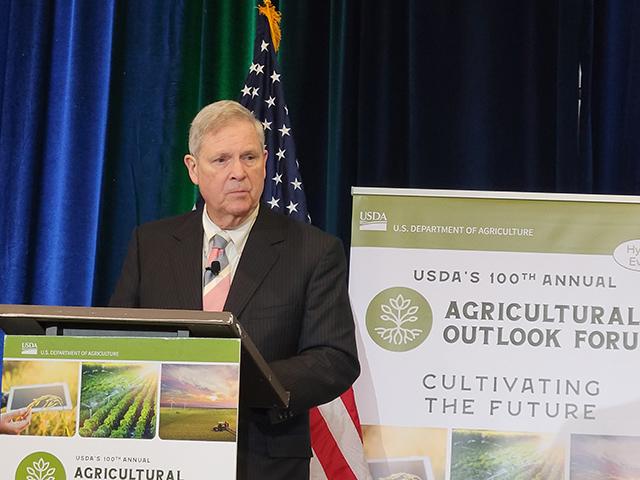Ag Policy Blog
Vilsack Draws Criticism Over Production Ag and Climate Policies
A protestor on Thursday disrupted Agriculture Secretary Tom Vilsack's speech near the beginning of the USDA Agricultural Outlook Forum.
The protestor complained about spending money for the poultry industry and "factory farms." She made the same comments multiple times about the poultry "bailout" before being escorted out of the forum. Vilsack noted the protestor's complaints came after Republican members of the House Agriculture Committee repeatedly insisted at a hearing on Wednesday that Vilsack and the Biden administration don't support production agriculture.
"Yesterday I was being told I didn't care about production agriculture and today I'm being told I care too much about it."
Vilsack's hearing was described as "sometimes prickly" by Chuck Abbott at the Food & Environment Reporting Network. Jerry Hagstrom, DTN's political correspondent, wrote, "members of the committee focused on their partisan views."
The hearing indicated there is a great deal that must happen within the House Ag Committee before that group is ready to pass a farm bill.
Asked about the hearing at a press conference during the Outlook Forum, Vilsack said hearings with the Agriculture Committee aren't often as "theatrical" as other committees in Congress, and Vilsack said he believes there is mutual respect between himself, the chairman and ranking member of House Agriculture Committee.
"Having said that, I think these hearings are a wasted opportunity," Vilsack said.
The secretary added he was frustrated there was little real talk about the farm bill or using the Commodity Credit Corporation (CCC) fund in a way that could help achieve some of the goals of the committee to increase support for farmers.
"It's unfortunate there weren't more questions about how we could be creative about the farm bill. How could we use the CCC in a way that could eventually open up more revenues necessary to do what the members of the committee want?"
Right now, he added, farm policy isn't looking enough at creating new markets for farmers -- beyond simply trade for commodities.
"The whole notion of how we focus on agriculture is about creating support," he said. "We need to be thinking about creating additional markets, better markets, more markets, new markets."
P[L1] D[0x0] M[300x250] OOP[F] ADUNIT[] T[]
The secretary said there's an opportunity to look at broader ideas -- and USDA has its attention on climate-smart commodities, carbon sequestration, and developing a larger biofuels market through sustainable aviation fuels. He also thinks farm policies don't do enough to help small and mid-sized producers.
"Hey, can't we do better? Can we think bigger? Can we aim higher? We can have production. We need production, but it doesn't have to be at the exclusion of small and mid-sized operators."
That focus on climate, though, drew the ire of Rep. Mary Miller, R-Ill., who said the Biden administration is plunging the country into following a "radical climate scam." Miller added, "This administration's policies threaten our farmers."
Miller kept drawing back to the farmer protests in Europe over climate mandates. "The majority of farmers are not on board with this climate-cult agenda."
Vilsack attempted to push back in the hearing, pointing to the range of farm groups that are participating in the Partnership for Climate-Smart Commodities. He said what's happening in Europe isn't comparable to USDA's programs. "Our program is voluntary, it's incentive-based and it's market-driven."
Miller then wanted to know about Vilsack's conversations with John Kerry, the U.S. climate envoy.
Vilsack on Thursday said he was "incredibly frustrated" with the Illinois representative. "She didn't understand the reason farmers in Europe are upset is because have regulated, mandated system."
He added that European farmers tell him they would love to follow the U.S. model. "Our system is not forcing farmers; it's creating an economic incentive for them." He added that climate-smart programs "give them the tools to be able to create new streams of income."
Wednesday's hearing revolved around a range of repeated themes between Republicans and Democrats. Republicans pointed to the rising percentage of nutrition programs in the USDA budget compared to everything else. At the same time, they pointed to rising food inflation affecting Americans at the grocery store under the Biden administration. Democrats countered that the GOP can't move to cut SNAP spending while complaining about the costs of groceries.
There were key questions at times about trying to solve other problems. Rep. Don Bacon, R-Neb., pointed to cybersecurity attacks on the U.S. food supply, most notably the attack on meatpacker JBS two years ago. Bacon said he is working on legislation to create research centers for cybersecurity and the food supply at land-grant universities. Vilsack credited Bacon for "putting a spotlight on this, but noted creating such centers needs to have the funding to make it work. Vilsack said the administration is trying to work with companies to improve their protections against cyberattacks.
"There is an inter-agency effort in this administration to sort of focus on cybersecurity -- on AI in particular -- and taking a look at the entirety of our portfolio, from food safety to SNAP bias to market manipulation to trade policy," Vilsack said.
Rep. Dusty Johnson, R-S.D., also delved into highly-pathogenic avian influenza and the depopulation of now 81 million birds. He asked about a vaccine and the secretary explained a few of the complications.
"We're probably 18 months or so away from being able to identify identifying a vaccine that would be effective for this particular strain of HPAI that we're dealing with now," Vilsack said.
"The problem, of course, is it mutates."
Once a vaccine is actually viable, there are then questions about practically delivering it to millions of birds. Then there are questions about how trading partners would react to a vaccine.
"We are nowhere near being able to do it from the standpoint of trade," the secretary said.
Also see, "Vilsack Sees 'Chaos in the Marketplace' as Repercussion Over California's Prop 12," https://www.dtnpf.com/…
Chris Clayton can be reached at Chris.Clayton@dtn.com
Follow him on X, formerly known as Twitter, @ChrisClaytonDTN
(c) Copyright 2024 DTN, LLC. All rights reserved.






Comments
To comment, please Log In or Join our Community .